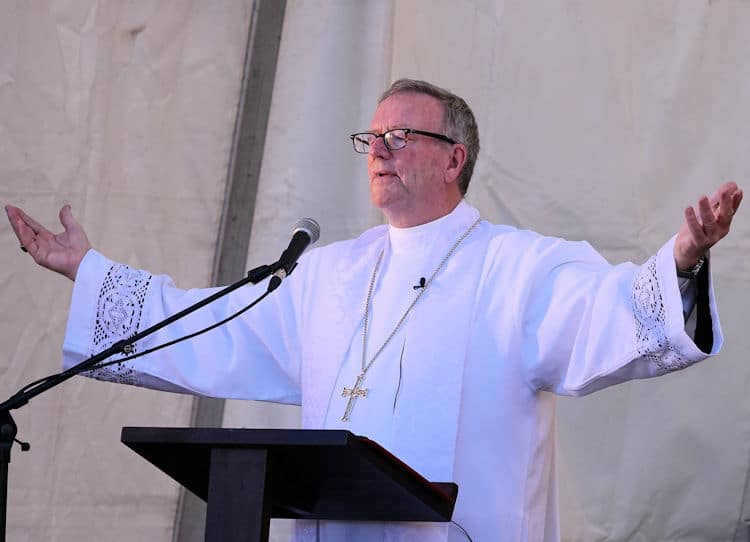The Bishop of Winona-Rochester, Robert Barron, graced our shores last week, hopping first to the <a href="https://www.arcforum.com/">Alliance for Responsible Citizenship’s conference</a>, then on to a parliamentary meet-and-greet, and now headlong into his own Evangelisation & Culture Conference (note the ‘s,’ of course). Who wouldn’t want to be more evangelical—or indeed cultured—especially when we’re being treated to the dulcet tones of an American prelate from the grand metropole visiting our humble island outpost?
In what only a (moneyed) Yank could muster, the conference took place at ExCeL London—part shopping mall, part theme park of convention events. Picture white-robed clerics rubbing shoulders with crowds of Pokémon enthusiasts, all tucking into their Chozen Noodles. It brought to mind that rather charming ecumenical blessing Pope John Paul II once offered the Pokémon franchise, lauding its promotion of ‘intense friendship.’
Towards our own gathering hub, what seemed like a crack team of Amazonian (maybe) Californian women greeted and guided the nearly 1,500 pilgrims coming to see the foremost tele-itinerant preacher off the American assembly line. The oft-proclaimed diversity of English Catholicism was on full display: British-Irish city dwellers, Newman-influenced corduroy wearers from the middle classes, and monastics aplenty from across the land. Seventy years ago, these groups might never have mingled so regularly; today, they’re swapping intellectual insights online before coming together in person—travellers even from as far afield as Australia among them. And the most pressing question on everyone’s lips? “When can we meet the Barron?”
They were no doubt happily surprised by the home-grown talent on display. The Abbot of Ampleforth’s high-toned welcome on the ordering of priorities particularly stuck with me: “Are you here for Bishop Barron?” Indeed, was he the real focus of this entire event of worship?
Against my own anti-American presumption before the event, the conference was already too aware of the lament many British Christians feel about the unstoppable tide of American evangelical tinges. Dominicans dotted the exhibition stalls, London youth groups handed out freebies, and—if I must confess—only British Catholic media were present: the Herald, poised proudly as the lone magazine stall.
The usual critique of this Americanisation goes something like: “We British simply aren’t built for that unrelenting American cheer.” It’s one thing to be told to rush out and preach the Good News; it’s quite another to do so while scanning a QR code in one hand, rosary in the other.
The prevalence of English Dominicans should surprise precisely no one keeping tabs on Word on Fire’s various alliances. After all, Thomistic and Dominican modes of thought have powered the Fire Team’s meteoric rise—and it only makes sense to trumpet the very roots of their approach. First, you get the odd viral Blackfriars video, then suddenly the men in white are popping up at events like this one. Perhaps, in Barron’s future vision of public Catholicism, Blackfriars will now take up the mantle of cultivating yet more outstanding public English Dominicans, such as Cardinal Radcliffe himself.
Barron has come to tell us we already possess the tools—so why cast him as our saviour? Our national tradition of ecumenism is something to celebrate: it’s not a narrowly insular focus on purely Catholic sources that will revitalise the faith, but rather a neighbourly Anglo-Catholicism that might just aid our current cultural tug-of-war.
Barron’s exchange with the Right Reverend N.T. Wright provided the clearest glimpse of the conference’s aim. He openly acknowledged how much he owes to this Anglican theologian—and rather suggested that we ought to do the same.
The bishop deftly skirted the Francis–Vance debacle on <em>ordo amoris</em> (the ordering of love within Catholic social teaching), and his somewhat muddled replies on the issue—dismissing it as ‘insignificant’ to the formidable Pauline scholar—only fuelled a yearning, intentional or not, for a Catholicism that learns from Anglican fellow travellers unafraid to tackle theology.
As Wright stated, “Christians have a lot of energy to love”—so why not combine this with an ordering of vigorous power to learn from other denominations as well?
Still, Word on Fire isn’t claiming to break new ground. Adoration of the Blessed Sacrament doesn’t suddenly become a thrilling innovation just because it takes place in a space that feels suspiciously like an airport hangar. And therein lies the beauty of Catholicism: it requires no human novelties, heralds no seismic methodology—by definition, it remains unchanged. So even if it did raise a few eyebrows when a late panellist anachronistically dubbed Jeff Bezos a “modern-day Pharaoh,” at least it pointed to reordering our commercial earthly hierarchies and restoring the spiritual to its immutable throne.
Perhaps the greatest testament to the event’s success came not from the dazzling American keynotes or the reassuringly British understatement, but from the harmonious chatter of so many different Catholic voices—young, old, robed, lay, and a few still slightly confused about the bishop’s political theology. It was a day of subtle bridging: the UK meeting the US, Dominic encountering Barron, English reticence shaking hands with Californian exuberance.
<em>Photo: Bishop Robert Barron at World Youth Day in Lisbon in 2023.</em>



